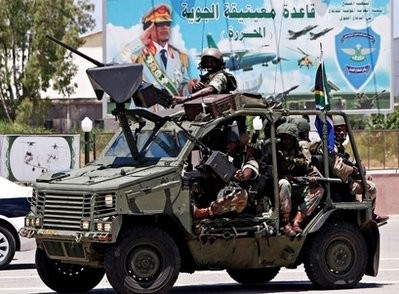NATO launched air raids early Tuesday on Tripoli after visiting South African President Jacob Zuma said that Moamer Kadhafi is "ready" to implement an African Union plan to end the Libyan conflict.
Zuma, representing the African regional group, held talks Monday with the Libyan leader as NATO insisted that Kadhafi's "reign of terror" is nearing an end.
"He is ready to implement the road map of the AU," Zuma told journalists in comments broadcast on South African and Libyan television. It would begin with a ceasefire that must include a halt of NATO bombing, Zuma said.
But the South African mediator did not publicly discuss the key obstacle: Kadhafi's departure. The rebels have reiterated they'll accept no settlement that keeps Kadhafi in power.

Kadhafi insists that "all Libyans be given a chance to talk among themselves" to determine the country's future, Zuma said.
Libyan state television reported fresh NATO air raids overnight Monday to Tuesday against targets in Tripoli, the suburb of Tajura and Al-Jafra, a city to the south of the capital.
The report, on Jamahiriya TV, cited a military source as saying that "NATO colonialist crusaders" had targeted military and civilian sites in Tripoli and Tajura, causing deaths and damage.
From the centre of Tripoli, which NATO warplanes have been attacking for several weeks now, an AFP reporter reported warplanes flying overhead and distant explosions around midnight local time (2200 GMT).
Jamahiriya TV also said there had been air raids on civilian and military sites in the city of Al-Jafra, 600 kilometres (370 miles) south of the capital.
Zuma said that NATO raids were undermining African mediation efforts.
"Even going there had to be delayed because of bombing," he said in apparent reference to an initial AU mission to Libya.
"We only went there long after the time that we had taken a decision, and even going there, you have to ask permission from the NATO to get to Libya."
In Rome, meanwhile, five generals, two colonels and a major announced they had defected from Kadhafi's forces -- and also said the regime's army was now at 20-percent capacity.
Abdel Rahman Shalgham, a former foreign minister who was Tripoli's UN representative before switching sides, told a press conference: "These officers are among 120 who left Kadhafi and Libya over the last few days."
"We hope more will join us and the Libyan people, and leave the side of this despot and criminal," he said.
Zuma arrived in Tripoli shortly after state media said NATO-led air strikes on the town of Zliten, west of the rebel-held city of Misrata, had killed 11 people.
The South African presidency said Zuma was seeking an immediate ceasefire, to boost humanitarian aid and bring about the reforms needed to eliminate the cause of the conflict which erupted amid anti-regime protests in mid-February.
Libyan state television said Zuma would discuss implementing the AU "roadmap" for peace, as it reported NATO-led raids on the Nafusa mountains in the far west and the town of Bani Walid, near Misrata.
At a meeting of NATO's parliamentary assembly in Bulgaria, NATO Secretary General Anders Fogh Rasmussen insisted: "Kadhafi's reign of terror is coming to an end.
"He is increasingly isolated at home and abroad. Even those closest to him are departing, defecting or deserting. ... It is time for Kadhafi to go as well," Rasmussen said.
In Rome, Libyan General Salah Giuma Yahmed said the ongoing defections meant Kadhafi's forces could no longer prop up the regime.
"NATO forces are paralysing Kadhafi's troops, they are now running at about 20 percent of their military capacity," he told reporters.
The Libyan regime also got support from two French lawyers who planned to initiate legal proceedings against France's President Nicolas Sarkozy for crimes against humanity over the Libya campaign.
Libyan justice ministry official Ibrahim Boukhzam told reporters in Tripoli that Jacques Verges and Roland Dumas had offered to represent families he said were victims of the NATO bombs.
Mustafa Abdul Jalil, who heads the rebels' provisional government, welcomed a Friday call by G8 world powers for Kadhafi to stand down, saying it was the position reflective of the "will of the international community as well as the demands and aspirations of the Libyan people."
The rebel leaders, called the National Transitional Council (NTC), announced Monday that they had renamed their armed forces the National Liberation Army (NLA).
On the humanitarian front, the European Commission announced 10 million euros ($14 million) in aid for refugees. It said 40,000 Chadian workers trying to flee Libya were stranded in "dire conditions" at the border with Chad.
Qatar, meanwhile, has opened a government-financed refugee camp in southern Tunisia to host 1,600 Libyan refugees, a camp official said.
























